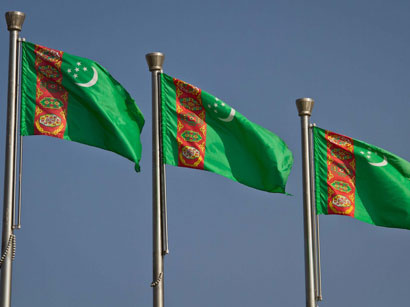Turkmenistan president calls for development of oil reserves in Caspian Sea

By Aynur Jafarova
Turkmenistan president calls for development of oil reserves in the Turkmen sector of the Caspian Sea.
Addressing a special meeting in Ashghabat, Gurbanguly Berdymukhamedov urged his government officials to be after long-term plans in this regard.
Berdymukhamedov noted Turkmenistan should take all necessary measures for the development of the onshore fields that have sufficient oil reserves.
Turkmen State Agency for Management and Use of Hydrocarbon Resources was instructed "to increase oil production in the short- term and to attract the world famous companies for the discovery and exploration of new oil and gas fields."
The Turkmenoil State Concern plans to adopt more geological and technical measures in the Turkmen sector of the Caspian Sea in 2014.
The hydrocarbon resources of the Caspian Sea's Turkmen shelf are estimated at 12 billion tons of oil and 6.5 trillion cubic meters of gas. Turkmenistan has put 32 licensed blocks with projected reserves of 11 billion tons of oil and 5.5 trillion cubic meters of for international tender.
The country considers it a priority to sign the production sharing agreements with foreign companies.
The Turkmen specialists believe more than 80 percent of reserves on the Turkmen sector of the Caspian Sea are in sediments located at a depth of over 3,000 meters.
Petronas, Dragon Oil, Buried Hill, RWE Dea AG, Itera and Zarubezhneft have been involved in the development of the Turkmen sector of the Caspian Sea. Over $10 billion has been invested in the development of the Turkmen sector of the Caspian Sea.
TAPI construction should start next year
Berdymukhamedov went on to say that the construction of the Turkmenistan-Afghanistan-Pakistan-India (TAPI) gas pipeline should be started in 2015.
The Turkmen president also instructed the relevant bodies to prepare all the documents related with the implementation of the TAPI project and to conduct necessary work on signing of these documents to start the construct project in 2015.
The TAPI project with the proposed capacity of 33 billion cubic meters of natural gas per year will extend from Galkynysh field in Turkmenistan through the Afghan cities of Herat and Kandahar to its final point at a settlement on the Pakistani-Indian border.
The Asian Development Bank (ADB) serves as a transactional advisor on TAPI gas pipeline project. Its main task is to develop the project company TAPI Ltd., as well as to search for the leader of the consortium to implement one of the largest energy projects in the vast Asian space.
Experts believe that TAPI is not only a regional project envisaging the transportation of Turkmen gas, but also a global project. The implementation of the project will strengthen Turkmenistan's independence, and its gas supplies to world markets will increase significantly.
The project is an opportunity to contribute to the stabilization of Afghanistan, and its implementation could contribute to the rehabilitation process in the post-war country as it will create job opportunities and provide Afghanistan with guaranteed income from the transit.
Realizing Trans-Caspian pipeline
Berdymukhamedov also appreciated the works to press ahead the Trans-Caspian gas pipeline project.
The Trans-Caspian Gas Pipeline with a length of around 300 kilometers will be laid from the Turkmen coast of the Caspian Sea to Azerbaijan, where it will be linked to the Southern Gas Corridor. The pipeline's capacity is 30-40 billion cubic meters of gas per year.
Both Azerbaijan and Turkmenistan, two Caspian littoral countries, are interested in the use of alternative routes for the transportation of energy resources from the resource-rich Caspian region to European markets.
Talks on the construction of the Trans-Caspian Gas Pipeline between Turkmenistan, the EU, and other countries have been held since late 1990s. The negotiation process intensified after the EU issued a mandate to start negotiations on the preparation of an agreement between the EU, Azerbaijan, and Turkmenistan on the Trans-Caspian project in September 2011.
Ashgabat believes that the agreement between Turkmenistan and Azerbaijan, the territories of which are covered by the project, is sufficient for laying a pipe under the Caspian Sea.
Baku has expressed readiness to provide its territory, transit opportunities, and infrastructure for its implementation, as reported by representatives of Azerbaijan's state energy company SOCAR.
Azerbaijan will benefit from transportation of gas through the Trans-Caspian gas pipeline as the implementation of this project will make Azerbaijan not only a supplier of gas, but also a transit country.
Here we are to serve you with news right now. It does not cost much, but worth your attention.
Choose to support open, independent, quality journalism and subscribe on a monthly basis.
By subscribing to our online newspaper, you can have full digital access to all news, analysis, and much more.
You can also follow AzerNEWS on Twitter @AzerNewsAz or Facebook @AzerNewsNewspaper
Thank you!
